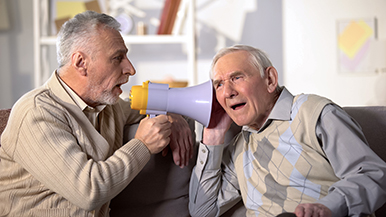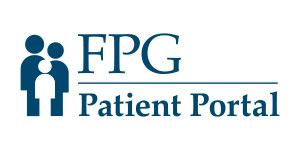With FPG Audiologist Sharon Rende
Communication disorders can affect people of all ages, from infants to the elderly. And according to the Center for Hearing and Communication and the World Health Organization, hearing loss affects nearly 48 million Americans and more than 1.5 billion people globally. Unfortunately, too many people ignore their symptoms or deny treatment, potentially turning an easily addressed issue into a serious problem.
Communication Builds Connections, Hearing Loss Hurts Relationships
Whether it’s with family, friends or colleagues, good communication skills are essential for maintaining health relationships. By affecting the ability to communicate, hearing loss can greatly impact quality of life, degrading both mental and physical health. If left untreated, hearing loss may even result in:
- Social isolation/Loneliness
- Depression/Anxiety
- Migraines
- Fatigue
- Cognitive decline/Dementia
- Balance issues/falls
- Stress/high blood pressure
The Importance of Intervention, Finding Treatment for Hearing Loss
Early intervention is critical in addressing communication disorders. The earlier a communication disorder is detected and treated, the better the chances for positive outcomes. This is particularly true for children, as their brains are still developing and they are in a critical period for learning language and communication skills.
So why do people wait an average of seven years before seeking treatment for hearing loss? Often, because of the stigma or because they’re in denial. Sometimes it’s confusion on where to start the process. But you have to look for the signs.
Signs that you may have a hearing problem include:
- Having to ask people to repeat themselves or to speak louder
- Speech sounds soft and muffled (“If only they didn’t mumble…”)
- Trouble hearing high pitched sounds (birds, doorbells, telephone)
- Having to look at a person’s face in order to understand them
- Being unable to hear in a group conversation, especially in noise
- Listening to the TV at a high volume
- Experiencing a ringing in your ears or pain
- Increasing balance or dizziness problems
Recognizing Speech and Hearing Disorders in Children
BSpeech, language and hearing problems can significantly impact learning, as well as social and emotional health. Even a mild hearing loss can harm a child’s ability to speak, learn and interact with others, and should be evaluated by a professional.
Signs that your child may have a hearing loss include:
- Abnormal speech for their age
- Delayed language skills
- Listening to TV or music at high volumes
- Learning difficulties
- Not responding to their name or loud sounds
- Not paying attention to conversations
- Asking “Huh?” and “What?”
- Fatigue or irritability after school
Finding Help for Hearing Loss
If you’re living with untreated hearing or communication disorders, talk to a doctor about diagnosis and treatment options, which include everything from speech and voice therapy to surgical and technological options, like hearing aids or cochlear implants.
Your primary care doctor can get you on the right track, or you can make an appointment with FPG’s Ear, Nose and Throat (ENT) specialists.
 Sharon Rende, AuD, ABAC is a board certified audiologist with First Physicians Group. For more information regarding speech and hearing disorders, including information about testing, click here.
Sharon Rende, AuD, ABAC is a board certified audiologist with First Physicians Group. For more information regarding speech and hearing disorders, including information about testing, click here.


